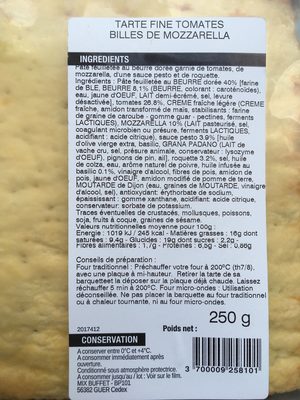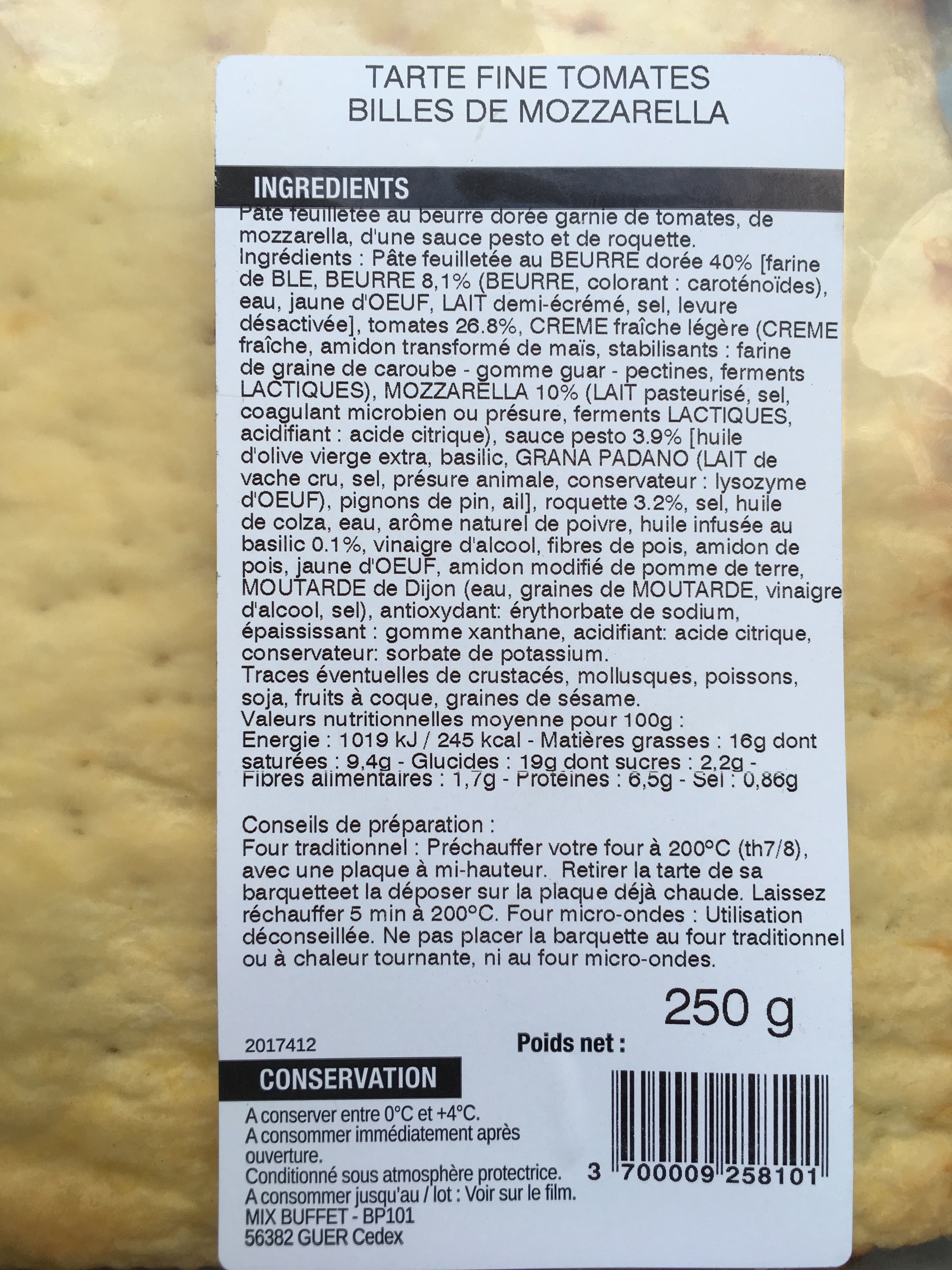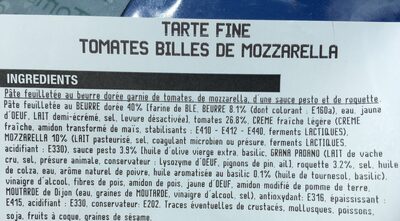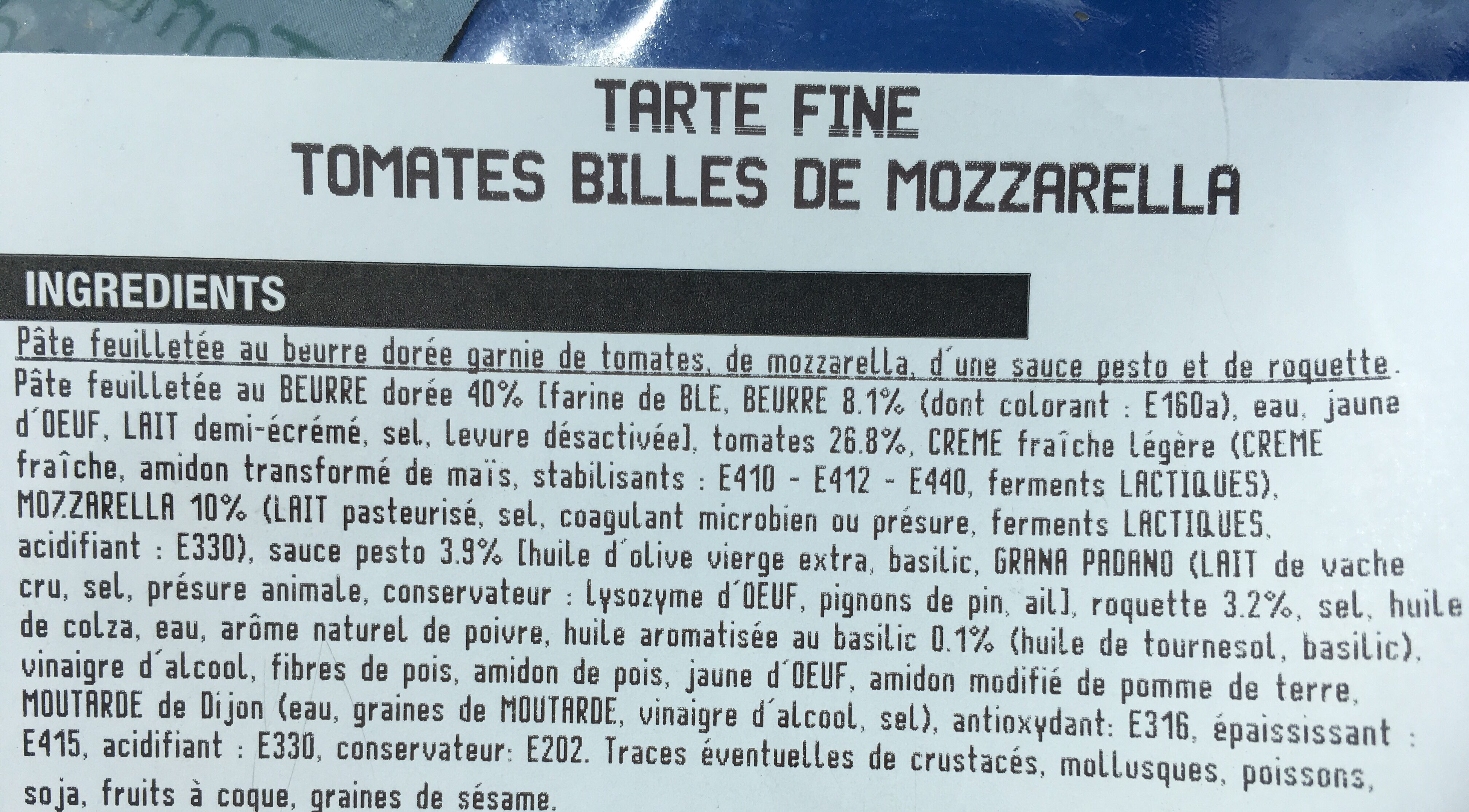Help us make food transparency the norm!
As a non-profit organization, we depend on your donations to continue informing consumers around the world about what they eat.
The food revolution starts with you!
Tarte tomates billes de mozzarella - Intermarche
Tarte tomates billes de mozzarella - Intermarche
This product page is not complete. You can help to complete it by editing it and adding more data from the photos we have, or by taking more photos using the app for Android or iPhone/iPad. Thank you!
×
Barcode: 3700009258101 (EAN / EAN-13)
Common name: Pâte feuilletée au beurre dorée garnie de tomates, de mozzarella, d'une sauce pesto et de roquette.
Brands: Intermarche
Categories: Plant-based foods and beverages, Plant-based foods, Cereals and potatoes, Cereals and their products, Pie dough
Stores: Intermarché
Countries where sold: France
Matching with your preferences
Health
Ingredients
-
64 ingredients
: Pâte feuilletée au BEURRE dorée 40% [farine de BLE, BEURRE 8.1% (dont colorant : E160a), eau, jaune d'OEUF, LAIT demi-écrémé, sel, levure désactivée], tomates 26.8%, CREME fraîche légère (CREME fraîche, amidon transformé de maïs, stabilisants E410 - E412 - E440, ferments LACTIQUES), MOZZARELLA 10% (LAIT pasteurisé, sel, coagulant microbien ou présure, ferments LACTIQUES. acidifiant : E330), sauce pesto 3.9% [huile d'olive vierge extra, basilic, GRANA PADANO (LAIT de vache cru, sel, présure animale, conservateur: Lysozyme d'OEUF, pignons de pin, ail], roquette 3.2%, sel, huile de colza, eau, arôme naturel de poivre, huile aromatisée au basilic 0.1% (huile de tournesol, basilic). vinaigre d'alcool, fibres de pois, amidon de pois, jaune d'OEUF, amidon modifié de pomme de terre, MOUTARDE de Dijon (eau, graines de MOUTARDE, vinaigre d'alcool, sel), antioxydant: E316, épaississant: E415, acidifiant : E330, conservateur: E202. Traces éventuelles de crustacés, mollusques, poissons, soja, fruits à coque, graines de sésame.Allergens: Eggs, Gluten, Milk, MustardTraces: Crustaceans, Fish, Molluscs, Nuts, Sesame seeds, Soybeans
Food processing
-
Ultra processed foods
Elements that indicate the product is in the 4 - Ultra processed food and drink products group:
- Additive: E14XX - Modified Starch
- Additive: E160a - Carotene
- Additive: E410 - Locust bean gum
- Additive: E412 - Guar gum
- Additive: E415 - Xanthan gum
- Additive: E440 - Pectins
- Ingredient: Colour
- Ingredient: Flavouring
- Ingredient: Thickener
Food products are classified into 4 groups according to their degree of processing:
- Unprocessed or minimally processed foods
- Processed culinary ingredients
- Processed foods
- Ultra processed foods
The determination of the group is based on the category of the product and on the ingredients it contains.
Additives
-
E160a - Carotene
Carotene: The term carotene -also carotin, from the Latin carota, "carrot"- is used for many related unsaturated hydrocarbon substances having the formula C40Hx, which are synthesized by plants but in general cannot be made by animals -with the exception of some aphids and spider mites which acquired the synthesizing genes from fungi-. Carotenes are photosynthetic pigments important for photosynthesis. Carotenes contain no oxygen atoms. They absorb ultraviolet, violet, and blue light and scatter orange or red light, and -in low concentrations- yellow light. Carotenes are responsible for the orange colour of the carrot, for which this class of chemicals is named, and for the colours of many other fruits, vegetables and fungi -for example, sweet potatoes, chanterelle and orange cantaloupe melon-. Carotenes are also responsible for the orange -but not all of the yellow- colours in dry foliage. They also -in lower concentrations- impart the yellow coloration to milk-fat and butter. Omnivorous animal species which are relatively poor converters of coloured dietary carotenoids to colourless retinoids have yellowed-coloured body fat, as a result of the carotenoid retention from the vegetable portion of their diet. The typical yellow-coloured fat of humans and chickens is a result of fat storage of carotenes from their diets. Carotenes contribute to photosynthesis by transmitting the light energy they absorb to chlorophyll. They also protect plant tissues by helping to absorb the energy from singlet oxygen, an excited form of the oxygen molecule O2 which is formed during photosynthesis. β-Carotene is composed of two retinyl groups, and is broken down in the mucosa of the human small intestine by β-carotene 15‚15'-monooxygenase to retinal, a form of vitamin A. β-Carotene can be stored in the liver and body fat and converted to retinal as needed, thus making it a form of vitamin A for humans and some other mammals. The carotenes α-carotene and γ-carotene, due to their single retinyl group -β-ionone ring-, also have some vitamin A activity -though less than β-carotene-, as does the xanthophyll carotenoid β-cryptoxanthin. All other carotenoids, including lycopene, have no beta-ring and thus no vitamin A activity -although they may have antioxidant activity and thus biological activity in other ways-. Animal species differ greatly in their ability to convert retinyl -beta-ionone- containing carotenoids to retinals. Carnivores in general are poor converters of dietary ionone-containing carotenoids. Pure carnivores such as ferrets lack β-carotene 15‚15'-monooxygenase and cannot convert any carotenoids to retinals at all -resulting in carotenes not being a form of vitamin A for this species-; while cats can convert a trace of β-carotene to retinol, although the amount is totally insufficient for meeting their daily retinol needs.Source: Wikipedia
-
E202 - Potassium sorbate
Potassium sorbate (E202) is a synthetic food preservative commonly used to extend the shelf life of various food products.
It works by inhibiting the growth of molds, yeast, and some bacteria, preventing spoilage. When added to foods, it helps maintain their freshness and quality.
Some studies have shown that when combined with nitrites, potassium sorbate have genotoxic activity in vitro. However, potassium sorbate is generally recognized as safe (GRAS) by regulatory authorities.
-
E316 - Sodium erythorbate
Sodium erythorbate: Sodium erythorbate -C6H7NaO6- is a food additive used predominantly in meats, poultry, and soft drinks. Chemically, it is the sodium salt of erythorbic acid. When used in processed meat such as hot dogs and beef sticks, it increases the rate at which nitrite reduces to nitric oxide, thus facilitating a faster cure and retaining the pink coloring. As an antioxidant structurally related to vitamin C, it helps improve flavor stability and prevents the formation of carcinogenic nitrosamines. When used as a food additive, its E number is E316. The use of erythorbic acid and sodium erythorbate as a food preservative has increased greatly since the U.S. Food and Drug Administration banned the use of sulfites as preservatives in foods intended to be eaten fresh -such as ingredients for fresh salads- and as food processors have responded to the fact that some people are allergic to sulfites. It can also be found in bologna, and is occasionally used in beverages, baked goods, and potato salad.Sodium erythorbate is produced from sugars derived from different sources, such as beets, sugar cane, and corn. An urban myth claims that sodium erythorbate is made from ground earthworms; however, there is no truth to the myth. It is thought that the genesis of the legend comes from the similarity of the chemical name to the words earthworm and bait.Alternative applications include the development of additives that could be utilized as anti-oxidants in general. For instance, this substance has been implemented in the development of corrosion inhibitors for metals and it has been implemented in active packaging.Sodium erythorbate is soluble in water. The pH of the aqueous solution of the sodium salt is between 5 and 6. A 10% solution, made from commercial grade sodium erythorbate, may have a pH of 7.2 to 7.9. In its dry, crystalline state it is nonreactive. But, when in solution with water it readily reacts with atmospheric oxygen and other oxidizing agents, which makes it a valuable antioxidant.Source: Wikipedia
-
E330 - Citric acid
Citric acid is a natural organic acid found in citrus fruits such as lemons, oranges, and limes.
It is widely used in the food industry as a flavor enhancer, acidulant, and preservative due to its tart and refreshing taste.
Citric acid is safe for consumption when used in moderation and is considered a generally recognized as safe (GRAS) food additive by regulatory agencies worldwide.
-
E410 - Locust bean gum
Locust bean gum: Locust bean gum -LBG, also known as carob gum, carob bean gum, carobin, E410- is a thickening agent and a gelling agent used in food technology.Source: Wikipedia
-
E412 - Guar gum
Guar gum (E412) is a natural food additive derived from guar beans.
This white, odorless powder is valued for its remarkable thickening and stabilizing properties, making it a common ingredient in various food products, including sauces, dressings, and ice creams.
When used in moderation, guar gum is considered safe for consumption, with no known adverse health effects.
-
E415 - Xanthan gum
Xanthan gum (E415) is a natural polysaccharide derived from fermented sugars, often used in the food industry as a thickening and stabilizing agent.
This versatile food additive enhances texture and prevents ingredient separation in a wide range of products, including salad dressings, sauces, and gluten-free baked goods.
It is considered safe for consumption even at high intake amounts.
-
E440 - Pectins
Pectins (E440) are natural carbohydrates, predominantly found in fruits, that act as gelling agents in the food industry, creating the desirable jelly-like texture in jams, jellies, and marmalades.
Pectins stabilize and thicken various food products, such as desserts, confectioneries, and beverages, ensuring a uniform consistency and quality.
Recognized as safe by various health authorities, pectins have been widely used without notable adverse effects when consumed in typical dietary amounts.
Ingredients analysis
-
May contain palm oil
Ingredients that may contain palm oil: E160a
-
Non-vegan
Non-vegan ingredients: Butter, Egg yolk, Semi-skimmed milk, Light cream, Fresh cream, Mozzarella, Pasteurised milk, Grana Padano, Raw cow's milk, Animal-based rennet, Lysozyme from eggs, Egg yolkSome ingredients could not be recognized.
We need your help!
You can help us recognize more ingredients and better analyze the list of ingredients for this product and others:
- Edit this product page to correct spelling mistakes in the ingredients list, and/or to remove ingredients in other languages and sentences that are not related to the ingredients.
- Add new entries, synonyms or translations to our multilingual lists of ingredients, ingredient processing methods, and labels.
If you would like to help, join the #ingredients channel on our Slack discussion space and/or learn about ingredients analysis on our wiki. Thank you!
-
Non-vegetarian
Non-vegetarian ingredients: Animal-based rennet, Lysozyme from eggsSome ingredients could not be recognized.
We need your help!
You can help us recognize more ingredients and better analyze the list of ingredients for this product and others:
- Edit this product page to correct spelling mistakes in the ingredients list, and/or to remove ingredients in other languages and sentences that are not related to the ingredients.
- Add new entries, synonyms or translations to our multilingual lists of ingredients, ingredient processing methods, and labels.
If you would like to help, join the #ingredients channel on our Slack discussion space and/or learn about ingredients analysis on our wiki. Thank you!
-
Details of the analysis of the ingredients
We need your help!
Some ingredients could not be recognized.
We need your help!
You can help us recognize more ingredients and better analyze the list of ingredients for this product and others:
- Edit this product page to correct spelling mistakes in the ingredients list, and/or to remove ingredients in other languages and sentences that are not related to the ingredients.
- Add new entries, synonyms or translations to our multilingual lists of ingredients, ingredient processing methods, and labels.
If you would like to help, join the #ingredients channel on our Slack discussion space and/or learn about ingredients analysis on our wiki. Thank you!
: Pâte feuilletée au BEURRE dorée 40% (farine de BLE, BEURRE 8.1% (dont colorant (e160a)), eau, jaune d'OEUF, LAIT demi-écrémé, sel, levure désactivée), tomates 26.8%, CREME fraîche légère (CREME fraîche, amidon transformé de maïs, stabilisants (e410), e412, e440, ferments LACTIQUES), MOZZARELLA 10% (LAIT pasteurisé, sel, coagulant microbien, présure, ferments LACTIQUES, acidifiant (e330)), sauce pesto 3.9% (huile d'olive vierge extra, basilic, GRANA PADANO, LAIT de vache cru, sel, présure animale, conservateur (Lysozyme d'OEUF), pignons de pin, ail), roquette 3.2%, sel, huile de colza, eau, arôme naturel de poivre, au basilic 0.1% (huile de tournesol, basilic), vinaigre d'alcool, fibres de pois, amidon de pois, jaune d'OEUF, amidon modifié de pomme de terre, MOUTARDE de Dijon (eau, graines de MOUTARDE, vinaigre d'alcool, sel), antioxydant (e316), épaississant (e415), acidifiant (e330), conservateur (e202)- Pâte feuilletée au BEURRE dorée -> fr:pate-feuilletee-au-beurre-doree - percent_min: 40 - percent: 40 - percent_max: 40
- farine de BLE -> en:wheat-flour - vegan: yes - vegetarian: yes - ciqual_proxy_food_code: 9410 - percent_min: 8.1 - percent_max: 31.9
- BEURRE -> en:butter - vegan: no - vegetarian: yes - ciqual_proxy_food_code: 16400 - percent_min: 8.1 - percent: 8.1 - percent_max: 8.1
- dont colorant -> en:colour - percent_min: 8.1 - percent_max: 8.1
- e160a -> en:e160a - vegan: maybe - vegetarian: maybe - from_palm_oil: maybe - percent_min: 8.1 - percent_max: 8.1
- dont colorant -> en:colour - percent_min: 8.1 - percent_max: 8.1
- eau -> en:water - vegan: yes - vegetarian: yes - ciqual_food_code: 18066 - percent_min: 0 - percent_max: 8.1
- jaune d'OEUF -> en:egg-yolk - vegan: no - vegetarian: yes - ciqual_food_code: 22002 - percent_min: 0 - percent_max: 8.1
- LAIT demi-écrémé -> en:semi-skimmed-milk - vegan: no - vegetarian: yes - ciqual_proxy_food_code: 19041 - percent_min: 0 - percent_max: 7.93333333333333
- sel -> en:salt - vegan: yes - vegetarian: yes - ciqual_food_code: 11058 - percent_min: 0 - percent_max: 0.86
- levure désactivée -> en:deactivated-yeast - vegan: yes - vegetarian: yes - percent_min: 0 - percent_max: 0.86
- tomates -> en:tomato - vegan: yes - vegetarian: yes - ciqual_food_code: 20047 - percent_min: 26.8 - percent: 26.8 - percent_max: 26.8
- CREME fraîche légère -> en:light-cream - vegan: no - vegetarian: yes - ciqual_food_code: 19402 - percent_min: 11.56 - percent_max: 15.6
- CREME fraîche -> en:fresh-cream - vegan: no - vegetarian: yes - ciqual_food_code: 19402 - percent_min: 1.92666666666667 - percent_max: 15.6
- amidon transformé de maïs -> en:modified-corn-starch - vegan: yes - vegetarian: yes - ciqual_food_code: 9510 - percent_min: 0 - percent_max: 7.8
- stabilisants -> en:stabiliser - percent_min: 0 - percent_max: 5.2
- e410 -> en:e410 - vegan: yes - vegetarian: yes - percent_min: 0 - percent_max: 5.2
- e412 -> en:e412 - vegan: yes - vegetarian: yes - percent_min: 0 - percent_max: 3.9
- e440 -> en:e440a - vegan: yes - vegetarian: yes - percent_min: 0 - percent_max: 3.2
- ferments LACTIQUES -> en:lactic-ferments - vegan: maybe - vegetarian: yes - percent_min: 0 - percent_max: 2.66666666666667
- MOZZARELLA -> en:mozzarella - vegan: no - vegetarian: maybe - ciqual_food_code: 19590 - percent_min: 10 - percent: 10 - percent_max: 10
- LAIT pasteurisé -> en:pasteurised-milk - vegan: no - vegetarian: yes - ciqual_proxy_food_code: 19051 - percent_min: 5.7 - percent_max: 10
- sel -> en:salt - vegan: yes - vegetarian: yes - ciqual_food_code: 11058 - percent_min: 0 - percent_max: 0.86
- coagulant microbien -> en:microbial-coagulating-enzyme - vegan: yes - vegetarian: yes - percent_min: 0 - percent_max: 0.86
- présure -> en:rennet - vegan: maybe - vegetarian: maybe - percent_min: 0 - percent_max: 0.86
- ferments LACTIQUES -> en:lactic-ferments - vegan: maybe - vegetarian: yes - percent_min: 0 - percent_max: 0.86
- acidifiant -> en:acid - percent_min: 0 - percent_max: 0.86
- e330 -> en:e330 - vegan: yes - vegetarian: yes - percent_min: 0 - percent_max: 0.86
- sauce pesto -> en:pesto - vegan: maybe - vegetarian: maybe - ciqual_food_code: 11179 - percent_min: 3.9 - percent: 3.9 - percent_max: 3.9
- huile d'olive vierge extra -> en:extra-virgin-olive-oil - vegan: yes - vegetarian: yes - from_palm_oil: no - ciqual_food_code: 17270 - percent_min: 0.433333333333333 - percent_max: 3.9
- basilic -> en:basil - vegan: yes - vegetarian: yes - ciqual_food_code: 11033 - percent_min: 0 - percent_max: 1.95
- GRANA PADANO -> en:grana-padano - vegan: no - vegetarian: maybe - ciqual_food_code: 12123 - percent_min: 0 - percent_max: 1.3
- LAIT de vache cru -> en:raw-cow-s-milk - vegan: no - vegetarian: yes - ciqual_proxy_food_code: 19051 - percent_min: 0 - percent_max: 0.975
- sel -> en:salt - vegan: yes - vegetarian: yes - ciqual_food_code: 11058 - percent_min: 0 - percent_max: 0.86
- présure animale -> en:animal-based-rennet - vegan: no - vegetarian: no - percent_min: 0 - percent_max: 0.65
- conservateur -> en:preservative - percent_min: 0 - percent_max: 0.557142857142857
- Lysozyme d'OEUF -> en:lysozyme-from-eggs - vegan: no - vegetarian: no - percent_min: 0 - percent_max: 0.557142857142857
- pignons de pin -> en:pine-nuts - vegan: yes - vegetarian: yes - ciqual_food_code: 15025 - percent_min: 0 - percent_max: 0.557142857142857
- ail -> en:garlic - vegan: yes - vegetarian: yes - ciqual_food_code: 11000 - percent_min: 0 - percent_max: 0.433333333333333
- roquette -> en:rocket - vegan: yes - vegetarian: yes - ciqual_food_code: 20217 - percent_min: 3.2 - percent: 3.2 - percent_max: 3.2
- sel -> en:salt - vegan: yes - vegetarian: yes - ciqual_food_code: 11058 - percent_min: 0.1 - percent_max: 0.86
- huile de colza -> en:colza-oil - vegan: yes - vegetarian: yes - from_palm_oil: no - ciqual_food_code: 17130 - percent_min: 0.1 - percent_max: 0.86
- eau -> en:water - vegan: yes - vegetarian: yes - ciqual_food_code: 18066 - percent_min: 0.1 - percent_max: 0.86
- arôme naturel de poivre -> en:natural-pepper-flavouring - vegan: maybe - vegetarian: maybe - percent_min: 0.1 - percent_max: 0.86
- au basilic -> en:basil - vegan: yes - vegetarian: yes - ciqual_food_code: 11033 - percent_min: 0.1 - percent: 0.1 - percent_max: 0.1
- huile de tournesol -> en:sunflower-oil - vegan: yes - vegetarian: yes - from_palm_oil: no - ciqual_food_code: 17440 - percent_min: 0 - percent_max: 0.1
- basilic -> en:basil - vegan: yes - vegetarian: yes - ciqual_food_code: 11033 - percent_min: 0 - percent_max: 0.1
- vinaigre d'alcool -> en:alcohol-vinegar - vegan: yes - vegetarian: yes - ciqual_food_code: 11018 - percent_min: 0 - percent_max: 0.1
- fibres de pois -> en:pea-fiber - vegan: yes - vegetarian: yes - percent_min: 0 - percent_max: 0.1
- amidon de pois -> en:pea-starch - vegan: yes - vegetarian: yes - ciqual_proxy_food_code: 9510 - percent_min: 0 - percent_max: 0.1
- jaune d'OEUF -> en:egg-yolk - vegan: no - vegetarian: yes - ciqual_food_code: 22002 - percent_min: 0 - percent_max: 0.1
- amidon modifié de pomme de terre -> en:modified-potato-starch - vegan: yes - vegetarian: yes - ciqual_proxy_food_code: 9510 - percent_min: 0 - percent_max: 0.1
- MOUTARDE de Dijon -> en:dijon-mustard - ciqual_food_code: 11013 - percent_min: 0 - percent_max: 0.1
- eau -> en:water - vegan: yes - vegetarian: yes - ciqual_food_code: 18066 - percent_min: 0 - percent_max: 0.1
- graines de MOUTARDE -> en:mustard-seed - vegan: yes - vegetarian: yes - ciqual_food_code: 11013 - percent_min: 0 - percent_max: 0.1
- vinaigre d'alcool -> en:alcohol-vinegar - vegan: yes - vegetarian: yes - ciqual_food_code: 11018 - percent_min: 0 - percent_max: 0.1
- sel -> en:salt - vegan: yes - vegetarian: yes - ciqual_food_code: 11058 - percent_min: 0 - percent_max: 0.1
- antioxydant -> en:antioxidant - percent_min: 0 - percent_max: 0.1
- e316 -> en:e316 - vegan: yes - vegetarian: yes - percent_min: 0 - percent_max: 0.1
- épaississant -> en:thickener - percent_min: 0 - percent_max: 0.1
- e415 -> en:e415 - vegan: yes - vegetarian: yes - percent_min: 0 - percent_max: 0.1
- acidifiant -> en:acid - percent_min: 0 - percent_max: 0.1
- e330 -> en:e330 - vegan: yes - vegetarian: yes - percent_min: 0 - percent_max: 0.1
- conservateur -> en:preservative - percent_min: 0 - percent_max: 0.1
- e202 -> en:e202 - vegan: yes - vegetarian: yes - percent_min: 0 - percent_max: 0.1
Nutrition
-
Poor nutritional quality
⚠ ️Warning: the amount of fruits, vegetables and nuts is not specified on the label, it was estimated from the list of ingredients: 32This product is not considered a beverage for the calculation of the Nutri-Score.
Positive points: 1
- Proteins: 4 / 5 (value: 6.5, rounded value: 6.5)
- Fiber: 1 / 5 (value: 1.7, rounded value: 1.7)
- Fruits, vegetables, nuts, and colza/walnut/olive oils: 0 / 5 (value: 32.6602083333333, rounded value: 32.7)
Negative points: 15
- Energy: 3 / 10 (value: 1025, rounded value: 1025)
- Sugars: 0 / 10 (value: 2.2, rounded value: 2.2)
- Saturated fat: 9 / 10 (value: 9.4, rounded value: 9.4)
- Sodium: 3 / 10 (value: 344, rounded value: 344)
The points for proteins are not counted because the negative points are greater or equal to 11.
Nutritional score: (15 - 1)
Nutri-Score:
-
Nutrient levels
-
Fat in moderate quantity (16%)
What you need to know- A high consumption of fat, especially saturated fats, can raise cholesterol, which increases the risk of heart diseases.
Recommendation: Limit the consumption of fat and saturated fat- Choose products with lower fat and saturated fat content.
-
Saturated fat in high quantity (9.4%)
What you need to know- A high consumption of fat, especially saturated fats, can raise cholesterol, which increases the risk of heart diseases.
Recommendation: Limit the consumption of fat and saturated fat- Choose products with lower fat and saturated fat content.
-
Sugars in low quantity (2.2%)
What you need to know- A high consumption of sugar can cause weight gain and tooth decay. It also augments the risk of type 2 diabetes and cardio-vascular diseases.
Recommendation: Limit the consumption of sugar and sugary drinks- Sugary drinks (such as sodas, fruit beverages, and fruit juices and nectars) should be limited as much as possible (no more than 1 glass a day).
- Choose products with lower sugar content and reduce the consumption of products with added sugars.
-
Salt in moderate quantity (0.86%)
What you need to know- A high consumption of salt (or sodium) can cause raised blood pressure, which can increase the risk of heart disease and stroke.
- Many people who have high blood pressure do not know it, as there are often no symptoms.
- Most people consume too much salt (on average 9 to 12 grams per day), around twice the recommended maximum level of intake.
Recommendation: Limit the consumption of salt and salted food- Reduce the quantity of salt used when cooking, and don't salt again at the table.
- Limit the consumption of salty snacks and choose products with lower salt content.
-
-
Nutrition facts
Nutrition facts As sold
for 100 g / 100 mlCompared to: Pie dough Energy 1,025 kj
(245 kcal)-34% Fat 16 g -6% Saturated fat 9.4 g +15% Carbohydrates 19 g -60% Sugars 2.2 g -79% Fiber 1.7 g +16% Proteins 6.5 g +14% Salt 0.86 g -26% Fruits‚ vegetables‚ nuts and rapeseed‚ walnut and olive oils (estimate from ingredients list analysis) 32.66 %
Environment
-
Eco-Score not computed - Unknown environmental impact
We could not compute the Eco-Score of this product as it is missing some data, could you help complete it?Could you add a precise product category so that we can compute the Eco-Score? Add a category
Packaging
-
Missing packaging information for this product
⚠ ️ The information about the packaging of this product is not filled in.Take a photo of the recycling information Take a photo of the recycling information
Transportation
-
Origins of ingredients
Missing origins of ingredients information
⚠ ️ The origins of the ingredients of this product are not indicated.
If they are indicated on the packaging, you can modify the product sheet and add them.
If you are the manufacturer of this product, you can send us the information with our free platform for producers.Add the origins of ingredients for this product Add the origins of ingredients for this product
Report a problem
-
Incomplete or incorrect information?
Category, labels, ingredients, allergens, nutritional information, photos etc.
If the information does not match the information on the packaging, please complete or correct it. Open Food Facts is a collaborative database, and every contribution is useful for all.
Data sources
Product added on by kiliweb
Last edit of product page on by teolemon.
Product page also edited by autorotate-bot, openfoodfacts-contributors, vaporous.









